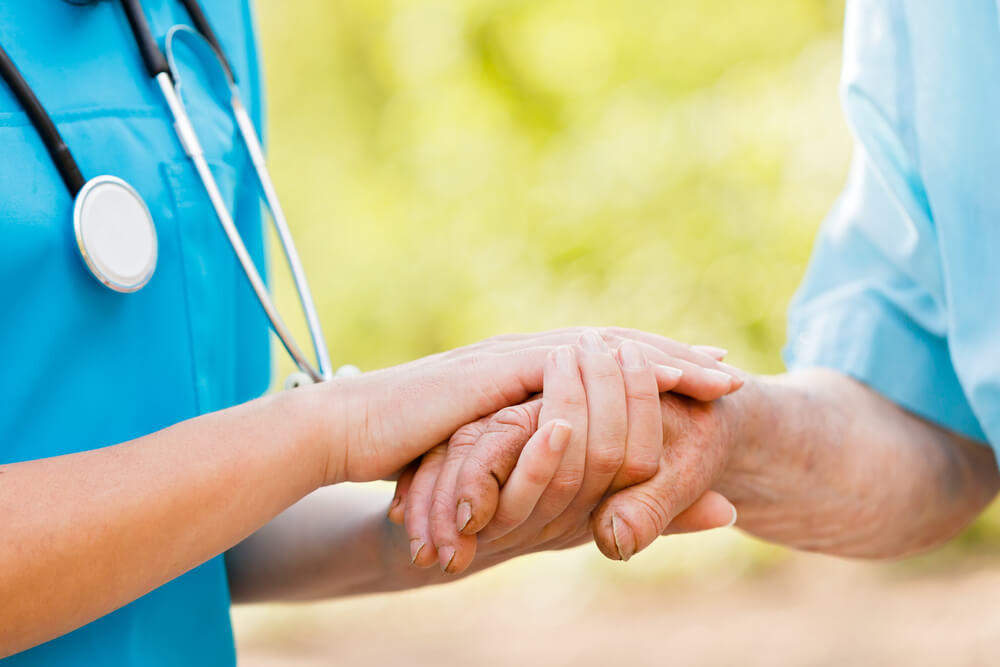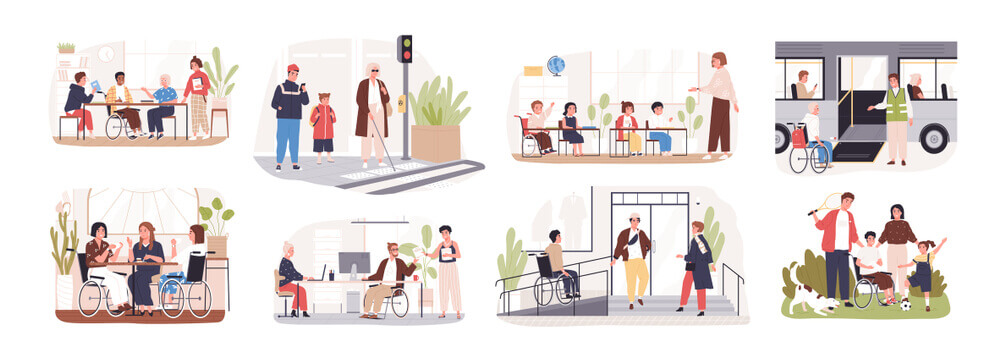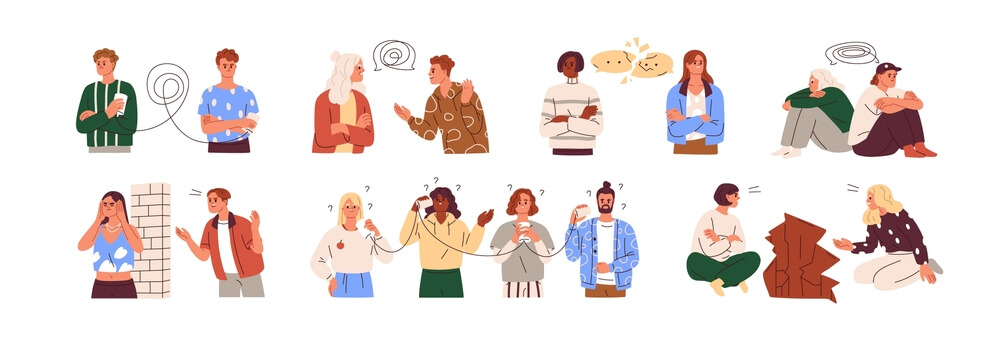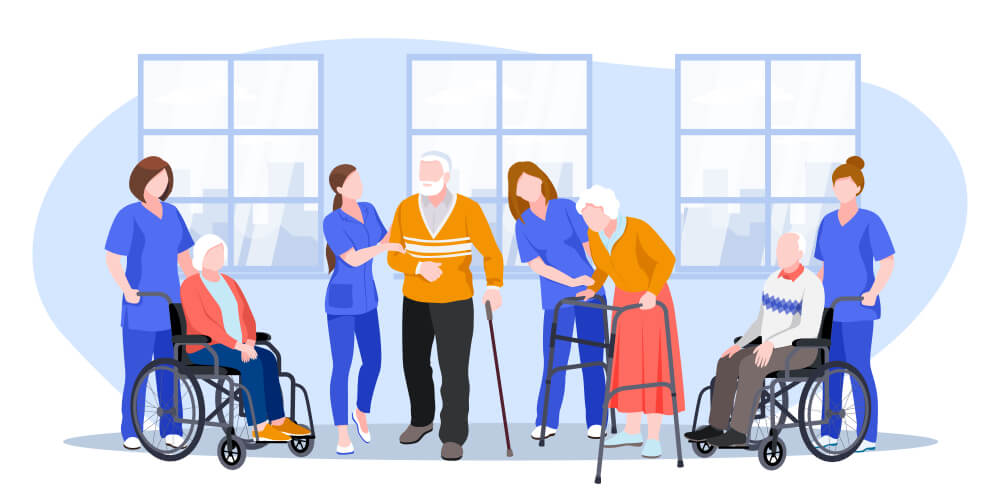

Healthcare workers use their communication skills to provide emotional support and protect patients’ privacy. The quality of communication in health and social care is crucial. This is because it affects the quality of care that patients receive. For example, you would be incapable of serving patients if you could not understand their necessities and priorities.
The nature of health and social care conditions means you will interact with people daily. So you must be able to communicate with them rightly. In addition, you need to understand how to treat them and respond correctly.
From this blog, you will learn-
Table of Contents
What is Communication in Health and Social Care?
Communication refers to the ways of expressing one’s thoughts or needs. It’s a two-way process, where an individual says his thoughts and is understood by others. And it is used to inform, express feelings, imagine, influence, and meet social expectations.
However, communication for health and social care is a bit different. It includes communicating with people having hearing impairments, autism, and dementia.
What are the Types of Communication in Health and Social Care?
Communication in health care includes different forms, mediums and channels. It is important to put equal focus on each of them.
Verbal vs Non-Verbal
Before a healthcare worker performs any medical procedure or care task with a patient, they must use verbal communication to inform the patient. This lets the patient know what to anticipate. The patient can also use verbal communication to tell the health care worker how they are feeling, what situations they are in, and any other questions the patient may have.
Non-verbal communication in health and social care includes communicating with eyes, hands and other body parts.

Formal vs Informal
Healthcare workers use formal communication when presenting hospital policies to patients and their families.
Whereas informal communication is less structured. It often permits more interaction and communication between patients and caregivers.
Technology-Aided
Not all patients can communicate on their own with their caretakers. In these instances, many use technology-aided communication instruments to hear or speak. For example, patients unable to speak may type their thoughts into a computer that speaks them out loud.
Signs and Symbols
Many healthcare settings are full of signs and symbols that communicate fast what a patient or visitor needs to understand. Using this type of communication is helpful in care settings. It allows individuals unable to read or understand an exact language to know what is being communicated.
Why is Communication Important in Health and Social Care?
Communication in health and social care is always important. Effective communication helps you understand the responsibilities of the individual you care for. Also, it helps to understand patients’ needs and deliver proper care. It also ensures good relationships with them.
Let’s see some significant aspects of communication’s importance in health and social care:

Good Communication can Significantly Improve People’s Health Condition
The ability to communicate effectively can also help you provide better care to your patients. It engages them in their treatment. And this will enable you to take an interest in managing the condition they’re struggling with.
It Helps to Understand the Emotion of Your Patient
The quality of your communication with the patients can influence how well you understand them. It mainly involves their physical and emotional well-being. Especially if you are a nurse or health care person, you can deliver better care if you communicate better with them.
Understand Patients of Different Ages and Mentalities
People of different ages require treatment differently. For example, you can not treat a young patient the same way you treat an old patient. This is because a kid’s psychology is different from an adult’s.
Similarly, a teen’s behaviour differs from an adult’s behaviour. Besides, you need to communicate well with both female and male patients. Therefore, you need to communicate effectively with good understanding and courtesy.
Provide Specialised Care and Track Your State of Treatment
Some patient has their religious thoughts and beliefs. So, you need to respect those beliefs and treat them according to their preferences. Besides, you can keep tracking your stages of care to see if you can communicate properly. Moreover, it can save money in different situations. On the other hand, poor communication skills can lead to ordering the wrong tests and prescribing the wrong medicines.
Therefore, effective communication in health and social care is vital to understand the needs and wants of a patient. It’s not always about patients, either. In a healthcare environment communicating effectively with co-workers and associates is also essential.
3 Must Have Communication Skills of Health and Social Care Workers
Health and social care workers need specific communication skills to provide effective care to their patients and interact with their families. These skills develop by interacting with the patients, proper training and a conscious effort to communicate well.
Verbal Communication
The most important communication skill for verbal communication. Verbal communication happens when one person speaks and another person listens. Good verbal communication skills help manage patients of distinct ages, gender and cultures. It helps to understand what others are expressing.
Care workers need different oral communication skills to discover an individual’s problems. It allows responding to questions to support others dealing with difficulties and objections.
Good verbal communication makes residents feel valued and cared for. It puts them in comfort. In addition, effective communication improves care services. Moreover, it creates a better working environment for carers. Good verbal communication allows transparency and exposure to daily tasks and requirements.
Examples of Verbal Communication in Health and Social Care
Here are some examples of verbal communication in health and social care:
- Asking questions to understand illnesses
- Discussing treatment plans with patients
- Giving instructions to care workers
- Speaking with a colleague about a patient
- Discussing a problem with a supervisor
Non-Verbal Communication
Using non-verbal communication, i.e., body language, is also vital in health and social care. Sometimes the service giver may find it hard to understand their patient verbally. Non-verbal cues come in handy in those instances.
Non-verbal communication can help to connect with the patients. Also, it can strengthen mutual understanding and respect. Besides, body language also helps decode other people’s moods and emotions.
Examples of Non-verbal Communication in Health and Social Care
Examples of non-verbal communication in health and social care include –
- good eye contact
- leaning in when talking to someone
- not crossing arms
- nodding
For instance, you can nod your head to acknowledge that you are engaged in the conversation. This helps them feel valued and heard. These are some commonly used non-verbal ways to communicate.
Active Listening
The care worker should have good listening skills to understand what the person is saying. And if they fail to listen to their patients correctly, they might not get the right treatment. They can use listening skills to check their understanding of patients’ illnesses and their needs. It helps to organise a conversation and empower the patient.
Good listening skill is necessary for doctors, nurses, and other healthcare workers. In addition, this serves as a tool for building trust and allegiance between each other. Active listening contains both verbal and non-verbal communication skills in healthcare.
Also, give people enough time to communicate and don’t rush them. Specific individuals, such as those with learning disabilities or communication difficulties, may take longer to express their feelings. So, you need to give them plenty of time and be supportive.
Active Listening Techniques
Some active listening techniques include the following.
- Demonstrating empathy and concern
- Paraphrasing or summarising to show understanding
- Employing non-verbal cues to show understanding, such as nodding, eye contact, and leaning forward
- Using verbal affirmations like “I see,” “I know,” “Sure,” “Thank you,” or “I understand.”
- Asking open-ended questions
- Asking specific questions to seek clarification
- Waiting to disclose your opinion
- Disclosing similar examples or experiences to show understanding

These skills should come naturally to a health or social worker. Along with their core English communication skills and number and general employability skills. They need to have natural compassion and be a people person.
Besides, they should educate their patients about treatment procedures, tests or medicines. So making a personal connection is also essential to all care workers.

5 Barriers to Communication in Health and Social Care
There are many barriers to effective communication in health and social care.
While it’s easy and clear to see how critical communication is. Some barriers may prevent you from communicating effectively with those you care for. These can include:
Mentality, Emotions and Attitudes
Mentality, emotions and attitudes can play a significant role in communication. For example, rushing a conversation with a service user because you are busy may come across as abrupt. You may make them uncomfortable and doubtful about communicating.
Similarly, someone who feels angry or upset may not like to share with you. They struggle to express themselves without letting their emotions take over.
Cultural Barrier
People are different based on different cultures. Everybody behaves differently, so you need to treat them accordingly. Additionally, If you and the service user speak different languages, it may be hard to communicate. Apart from this, people have other thoughts and beliefs. So, you can’t treat everybody similarly.
Specific Health Disorder or Condition
A particular health condition can make communicating difficult. For example, if they have dementia or a stroke, it may affect their ability to think. Additionally, someone with depression may find it hard to express their feelings.
Physical Disabilities
Some patients may be physically incapable of communicating, such as if they are in pain or breathless.

Environment Condition
Specific environments can make it challenging to communicate. For example, if the room is loud, You struggle to hear others. Besides, if the environment is too dim, warm or cold, they might be less likely to want to speak or communicate.
The Impact of Barriers to Communication in Health and Social Care
The main problem of barriers to communication will be providing appropriate treatment to the patients. Barriers are hindrances in communicating and understanding the patient well. Communication problems can lead to a wide range of adverse outcomes, such as inappropriate treatment and patient dissatisfaction. Additionally, resources are misused as a result.
Moreover, If the environment setting is very busy, there will be little privacy and communication may be impacted. For example, the person might not feel comfortable talking about personal problems in a public place. But, if the person can speak in private without other people being able to listen, communication will be more effective.
Overcoming Barriers to Communication in Health and Social Care
Communication barriers can be overcome by following a few steps. Such as
- Checking whether it is the right time and place to communicate with the person. Try to understand the person’s state of mind and feelings.
- Being transparent and using language that the person understands. Not all patients will talk in English, so they must use a language translator system.
- Try not to share more than one topic at the same time. Focus on and discuss a specific topic to help the patient get better treatment.
- Try to speak in a location free of distractions. Besides, try to understand the cultural beliefs and thoughts the patient posses.
- Acknowledging any emotional reactions the person has to what you have said.

How to Promote Effective Communication in Health and Social Care?
You can follow many ways to promote and improve effective communication in health and social care. Such as:
Firstly, use the most appropriate medium to talk with your patient. All patients are not able to communicate similarly. So use the most appropriate medium to communicate with them. Besides, whom you are treating may be sensitive and depressed. So try to understand their emotional phases.
Secondly, sometimes you have to get closer to an individual, such as when taking a blood sample or delivering personal care. Make sure what you are about to do before you move closer to them.
Thirdly, try to use comfortable communication tools so that you can understand the requirements and your team in a better way. Try to listen to your patient care and when you have something to communicate. Think of the most precise and comfortable way to get your message across.
Finally, never hesitate while talking. Besides, ask for clarification if needed. Moreover, try to avoid complex words while speaking. Finally, check your message several times before finalising them to deliver.

Here are some more tips to communicate effectively. Such as
- Be attentive to individuals.
- Ask them open-ended questions.
- Be curious and involve families and friends.
- Use the right tone while speaking and understand the individual’s mentality.
- Use different ways to communicate.
- Keep records and share your notes with patients.
How is Effective Communication Used in Health and Social Care?
Effective communication is essential when trying to build and support relationships. It is a method that involves questioning, responding, listening, and understanding. Besides, in social care, communication goes beyond understanding an individual and their problem.
Also, communication must be effective for all parties (doctor, nurse and patient) to understand the intent of the information conveyed. Care workers should be able to read patients’ minds and, when needed, handle potentially complicated issues.
What is Poor Communication and What are its Side-Effects?
Poor communication in health and social care happens when there is a clear contrast between what is said and what is heard. In other words, the person communicating misunderstands what you’re saying to them.
As a result, understanding is no longer mutual and fruitful. Poor communication in healthcare causes a decreased quality of care. It also causes high healthcare costs, poor patient outcomes, and wastage of resources. In addition, communication failures often harm patient and personnel satisfaction.
Summary
Effective communication in health and social care can ensure that you perform your role and treat patients well. Conversely, poor communication can be fatal for an individual. Good communication skills can help you create better results for your patients by engaging them with the treatment and taking an interest in handling the condition they’re struggling with.
Check out the health and social care course to become successful in the relevant profession.
FAQ
Why is Communication Important in Health and Social Care?
Communication is always essential, especially in sensitive health and social care. Good communication can help a patient who needs special care or attention. With proper communication, we can expect something good eventually.
How is Formal Communication Effective in Health and Social Care?
Formal communication is usually seen in hospital policies and records. However, this type of communication can be very inflexible, leaving little or no room for feedback or variation.
Sometimes a specific set of questions or format is carried out in a formal setting. Formal communication helps to understand a patient’s issues in a better way.
A meeting between a doctor and a patient about the line of work they will be doing. This is an example of formal communication in a health and social care setting.
How is Written Communication Effective in Health and Social Care?
Written communication is essential in health and social care environments. It is used for different purposes, such as keeping medical and patient records. Also, it’s used for recording personal details and preparing medical prescriptions or referrals.
In addition, written communication can catch your reader’s attention and get your opinion. When you communicate in writing, you are supporting the reader to understand your view on a specific problem.
What are the 6 types of communication in health and social care?
There are SIX different types of communication in health and social care. They are:
- Verbal communication;
- Written communication;
- Non-verbal communication;
- Formal communication;
- Informal communication;
- Active Listening.
What is Specialist Communication in Health and Social Care?
Specialist communication is a skill with many benefits. Most importantly, it helps you deliver person-centred, high-quality care. Without specialist communication knowledge, a person won’t understand what a patient needs. They will fail to identify if he has a particular problem or disorder.
So, try to speak clearly and listen carefully. It will help people to know what you’re saying. For example, mumbling and talking too quickly can lead to misunderstandings.


- Available Courses
- Construction39
- Teaching12
- Teaching & Academics Primary20
- Accounting & Finance Primary15
- Design4
- IT & Software38
- Healthcare77
- Marketing27
- Career Bundles69
- Health and Safety322
- Electronics24
- Hospitality21
- Health and Social Care192
- Child Psychology31
- Management314
- Business Skills236
- First Aid64
- Employability252
- Safeguarding59
- Food Hygiene96
- Personal Development1174






0 responses on "3 Must Have Communication Skills For Health And Social Care"